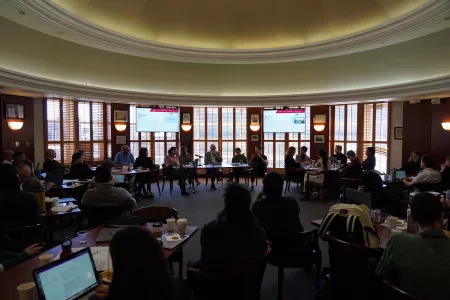
On April 2-4, 2023, the DAO Harvard conference brought together practitioners, policymakers, and academics to engage in conversation regarding the research, legal, and policy considerations of Decentralized Autonomous Organizations (DAOs). The conference, hosted by the Belfer Center’s Technology & Public Purpose Project and the Edmond and Lily Safra Center for Ethics, convened global participants across five continents here at Harvard University. This post will recap some of the major themes and takeaways from each of the individual summits– the Research Summit, Law Summit, and Summit on Equitable Ownership and Governance in the Online Economy.
Research Summit
The Research Summit at DAO Harvard was structured as a sequence of four panels on incentives, technology, operations, and governance. This curated convening aimed to refine research questions, determine research priorities, identify key obstacles to current research, and to foster collaborations across disciplinary divides. The Summit aligned with the release of the Open Problems in DAOs survey paper by Metagov, and concluded with the launch of a research grant funding round through Metagov and Gitcoin to ensure there are dedicated resources towards the research ideas coming out of the Summit.
Incentives: Panelists began by discussing micro and macro incentives within the space, and how while the focus tends to be on incentivizing the “right” behavior, these incentive structures can create both good and bad outcomes, some of which seem emergent and unexpected. This raised discussion around how builders in the space should be thinking about the principles they don’t want to violate before building a system– existing approaches such as existing standards for ethical building (e.g. EU, IEEE), legal frameworks, and continuous planning and reflection cycles were raised. There are unintended consequences that may emerge from complex human behavior being coordinated within any system and there is a need for ex-post decision-making processes to reconcile these unintended consequences.
Another key discussion point was around scarcity, which is inherent to incentives, and how the choice about which actors are identified and incentivized is critical. Infrastructure often has embedded politics and values, builders must be mindful of the politics which are entrenched in the system and the inequalities which may be created or exacerbated with the incentives they create. Analyzing the incentives within systems is another open question of research– while game theory is a starting point for the strategic interactions of agents, perhaps category theory and other analytical frameworks that factor in composability should be considered.
Technology, Law, and Institutional Design: Lawrence Lessig mentioned the parallels to early conversations about the internet and pointed out that the question here is not law, the question is of two very different cultures needing to operate together (technologists and lawyers) and how there is a need to translate these cultures. While “code is law”, it isn’t the only law, and the law will continue to bend towards justice. It is critical to build clear use cases that demonstrate why DAOs are valuable and should be allowed in society. Without these examples, the law will continue to destroy what is trying to be built in this space. Sandy Pentland pointed towards MIT Computational Law and Legal Dynamism as outlets exploring these types of questions at the intersection of law and technology. Further discussion included how the notion of fiduciary responsibility must be maintained, both by keeping an audit trail for continuous proof of compliance and how there must be clear liability. The experimentation being done in smaller states in the U.S. (e.g. Vermont and Wyoming) is incredibly valuable, particularly if they find shared agreement that other states can adopt.
The concept of model-based institution design explores how new cyber-physical systems might offer valuable insights to solve the existing challenges in institution design. To apply model-based institution design, it is critical to start with analyzing the entity’s environment (external context), people (internal context), and purpose. The application of cyber-physical systems for institution design might enhance transparency, resilience, and performance in modern institutions, with ongoing governance as a participatory, continuous redesign process. DAOs present the tip of the iceberg of where new institutional materials are made possible. This model-based approach could be a promising approach to address the complex changes of our rapidly evolving world.
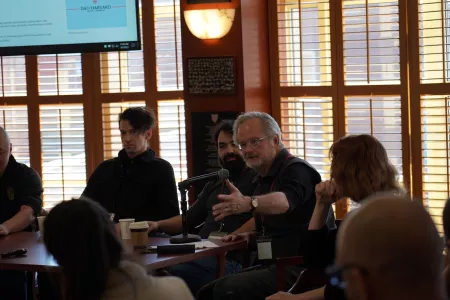
Operations: Ellie Rennie shared findings from her ethnographic research of permissionless systems and the governance of individuals– highlighting the aspects of voluntary participation, feedback loops within the organization, and behaviors when the case study organization began to fall apart. There was much conversation around the Ostrom design principles for governing the commons and how these might be updated for the digital world. Other practical operational challenges within DAOs were raised such as the complications of maintaining compliance over time, accounting (particularly given investments and divestments), the varying degrees in which people contribute to the organization, and the disconnect of bringing information on-chain. The topic of dispute resolution and autonomous justice demonstrated how DAOs are handling internal and external disputes in practice, and how they might settle these in an independent and sovereign manner from any rule-making body.
Governance: Danielle Allen spoke to the recently published Ethics of Decentralized Social Technologies and the beginning of an ethical framework being developed for this space. As a society, we have certain values and requirements of democratic governance, non-domination, self-determination, pluralism, coordination capacity, and others. This set of technologies has certain features such as trustlessness, disintermediation, regenerative economies, which should be experimented with prudence vigilance. While these technologies may be used to enhance our values, there are several risks at play (e.g. power consolidating with venture capital), which is why it is necessary to leverage an ethical framework.
Primavera De Filippi shared recent work on Blockchains and Constitutions, beginning with a set of theories around how decentralized technology is not decentralized power, how there is nothing natural about decentralization but it needs to exist, and how it is not always costless. Blockchain systems may leverage both formal constitutions (on-chain protocols, smart contract code) and material constitutions (off-chain informal rules). Eric Alston broke down governance as a rule-based ordering of people and resources made up of constitutions, organizations, and institutions. He highlighted the less identifiable artifacts such as norms, values, and culture that govern outcomes including animating purpose of the organization, institutional incompleteness, and the inevitability of conflict.
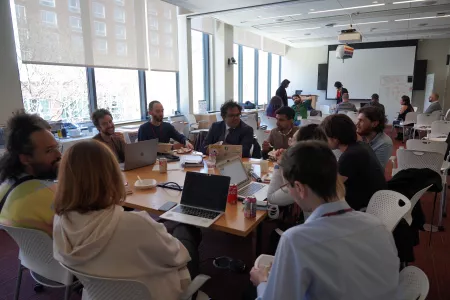
Law Summit
The Law Summit at DAO Harvard was structured as multiple parallel working groups, each tackling questions of DAOs and the law including the benefits and drawbacks of incorporation, the liability regime for DAOs, taxation, legal gateways, and technical standards for compliance via regulatory gateways. BlockchainGov and COALA helped co-organize the Law Summit with a focus on building off of the COALA DAO Model Law. The model law provides recommendations on how regulatory frameworks across jurisdictions can provide legal certainty for DAOs while accommodating for the unique affordances of DAOs and their various stakeholder groups. This approach has recently seen traction, particularly in the passing of the Utah DAO Bill.
Each working group was composed of an interdisciplinary mix of lawyers, academics, and practitioners. Insights from the working groups will be accommodated in a V2 of the COALA DAO Model Law. Below are highlights from some of the working groups:
Benefits and drawbacks of incorporation
The core question in this working group was: How can DAOs effectively integrate with the legal system? A major challenge discussed in this group was the delicate tension DAOs need to navigate in balancing the need to establish legal personhood and establishing legal clarity with the desire to remain digital-first organizations primarily incorporated on the blockchain. The discussion of recent cases in the ecosystem revealed that incorporating as a legal entity not only seems to contradict the very nature of DAOs but it also does not necessarily limit the liability of DAO participants, thus calling into question the solution of incorporation as a whole. Consequently, solutions to obtain regulatory clarity on issues such as liability and taxation, ideally should integrate DAOs into existing legal structures without requiring them to legally incorporate. Enhancing smart contract security through audits, testing, and standardization practices can minimize vulnerabilities. Legal frameworks defining liability and accountability, coupled with on-chain governance and dispute resolution mechanisms, can establish a clear path for DAO participants. Implementing investor protection mechanisms, collaborating with traditional institutions, and promoting education and awareness about DAOs were also seen as important steps forward.
Liability Regimes for DAOs
This working group mapped the liability risks for DAO developers, DAO members, users and block producers, and analyzed the implications of liability in previous cases, such as Tornado Cash, Ooki DAO, and Tulip Trading. At a high level, the top three challenges identified throughout the discussion were:
- Definition and Recognition of DAOs: Questions arose regarding whether DAOs should be recognized as legal entities, how liability should be attributed to DAOs, and how they can be regulated and held accountable. Issues of the legal definition and recognition of DAOs become especially pertinent in cross jurisdictional liability cases.
- Trade-offs between Autonomy and State Recognition: Finding a balance between granting autonomy to DAOs while ensuring legal compliance and accountability is a complex challenge. Different legislative efforts discussed within the group have varying approaches to address this trade-off.
- Determining Liability and Responsibility: Questions arose regarding the level of liability for different participants, including DAO members, developers, token holders, and others involved in the ecosystem. Differentiating liability based on levels of involvement, decision-making power, and touchpoints with the DAO seems crucial. Additionally, addressing issues of privacy and direct/indirect inclusion in the DAO structure presents challenges in determining liability boundaries.
Discussion also covered best practices to minimize and mitigate the risks associated with operating DAOs including self-insurance, disclosures and transparency, self-governance, adherence to industry-specific security standards, and the implementation of a business judgment rule/safe harbor to encourage innovation while managing liabilities responsibly. The group highlighted the need to think through internal governance mechanisms to preempt liability disputes being settled through lawsuits.
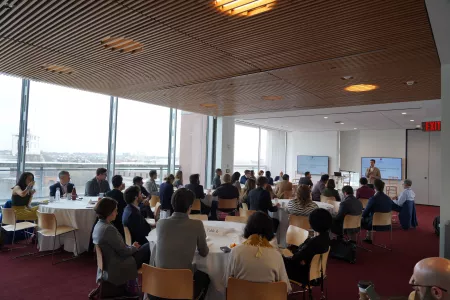
DAO Taxation
Ongoing questions of taxation permeate DAOs at both the entity and individual level. Key questions to consider here are: What constitutes a taxable event? Who does the tax obligation fall on and to whom should it be paid?
The history of the LLC is a history of adoption driven by regulatory certainty. Consequently, overcoming uncertainty regarding tax regulation is likely to be an impetus for growth of the entire DAO ecosystem. The group discussed two possible proposals towards creating such clarity:
- DAO Taxation is likely to change over the course of a DAO’s lifecycle, from a small group of people working on a shared idea to a large protocol DAO with governance tokens and high levels of smart contract enabled automation. The group proposed to create a regulatory sandbox which allows DAOs an exploratory phase to assess taxable events with different tax entities and across national taxation regimes. Ideally, if enough DAOs (with privacy guarantees) participate in the regulatory sandbox, we would be able to give informed advice for the benefit of policymakers.
- Another proposal was to explore more Web3 native tax regimes to accomplish regulatory equivalence. For example, DAOs could pay taxes to a smart contract, a type of DAO endowment. Establishing this pot of shared tax revenue could place the burden of distributing the income fall on the various jurisdictions, depending on a type of DAO model tax treaty. Ideally this mechanism allows DAOs to meet their compliance obligations without needing to incorporate or doxx individual members. Perhaps if revenue is left over or countries cannot agree on how to divide the tax then after a certain time it defaults to a public process that allocates the funds towards various public good initiatives.
DAO Legal Gateways
The aim of this working group was to explore legal gateway model(s) that would be more flexible than available incorporation solutions. Legal gateways and proxies ideally allow DAOs to act in legally compliant ways to increase their scope of action without requiring incorporation or specialized regulation. Use case areas for legal gateways discussed in the group included:
- Owning real world assets
- Legally compliant employment in DAOs and social security
- Dispute resolution mechanisms
- Conducting licenced activities
The group identified a number of legal gateways that already exist in the DAO ecosystem with examples such as Opolis and Toku to facilitate employing contributors in a legally compliant manner, as well as Kleros or DAODAO for dispute resolution services. The group discussed potential proxy systems that would be eligible for a regulatory exception and connect tokenized ownership with real-world ownership. In the context of US law, the following options of distributed ownership were mentioned: 1) Reg A or Reg D and 2) Purpose Trust (non-charitable trust). The group also discussed the potential for a “pool fund” of resources for legal defense.
Functional Equivalence, Regulatory Equivalence, and Technical Standards in DAOs
The group identified three case studies for regulatory compliance: a framework for precedential trust, compliant book-keeping for DAOs through “Proof of Trusted Origin,” and escrows for regulation crowdfunding.
- An implementable ontology for regulators to have an interpretation of the blockchain environment based on its technological components and their level of empirical precedential trust.
- A mechanism through which DAOs can guarantee respect to the right of payment privacy while being able to prove they are transacting only with “trusted entities” (including entities that have not been subject to sanctions by regulators).
- A registered intermediary or third party to ensure there are reasonable basis to believe no fraud has been committed on customer protection issues, making DAOs eligible to offer and sell securities through crowdfunding.
In order to consider functional equivalence or regulatory equivalence to promote healthier regulatory environments for DAOs, the general pain point identified is the need to communicate and demonstrate DAO operations to policymakers.
Summit on Equitable Ownership and Governance in the Online Economy
The Summit on Equitable Ownership and Governance brought together a group of 70+ leading policymakers, scholars, and industry leaders to explore the possibilities for enabling greater ownership and governance in our online economy. Discussion ranged from identifying the current harms and challenges of today’s centralized technology platforms, the experiences of cooperatives and decentralized autonomous organizations (DAOs) as alternative models, and the current policy landscape for cooperatives and blockchain technologies.
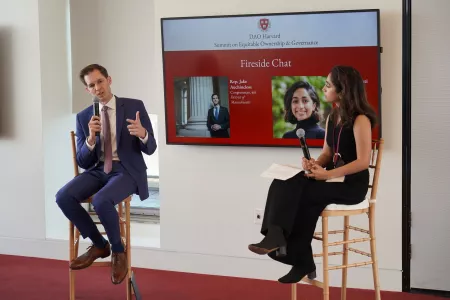
The event was divided into three main sections: the current state of online governance and regulatory environment, equitably owned and governed organizations in practice, and policy and regulation innovations and collaboration. Below we'll highlight the key points and themes from the day.
State of Online Governance and Regulatory Environment
Discussions revolved around the need to address the issues associated with big tech monopolies and the role of equitable ownership in mitigating these challenges. Several presenters talked about decentralization and cooperative structures as powerful alternatives to traditional centralized power structures, empowering individuals and communities in the process. One of the key takeaways was the importance of understanding and actively working to dismantle power imbalances in digital spaces.
Equitably Owned and Governed Organizations in Practice
In this section, speakers shared real-world examples of equitably owned and governed organizations, emphasizing the value of collaboration, innovation, and diversity in these models. Many presenters highlighted cooperatives and Decentralized Autonomous Organizations (DAOs). Some talks addressed the challenges and lessons learned from implementing these models, offering valuable insights for the broader community.
Policy and Regulatory Landscape
During the last phase of the summit, presenters discussed the need for collaboration between the blockchain industry and policymakers to create sensible regulations that balance innovation and consumer protection. Conversations touched on the importance of global perspectives in shaping policy, the need for greater education on the technology, and strategies to build trust and ensure data protection for users.
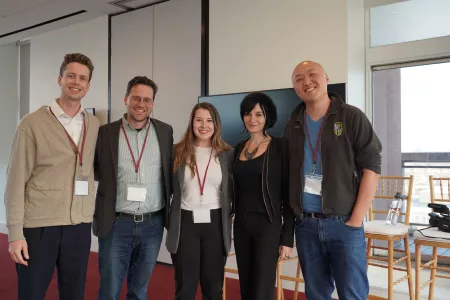
Common Themes
Throughout the summit, several common themes emerged:
- Cooperatives and DAOs: Many speakers discussed the potential of DAOs to promote equitable ownership and governance, with benefits including decentralization, collaboration, transparency, and regenerative value.
- The need for education and awareness: Greater understanding of DAOs and other equitable governance models among stakeholders, policymakers, and the general public is essential to drive their adoption and create a more equitable future.
- Collaboration with policymakers and regulators: A recurring theme was the need for engagement between the blockchain industry and policymakers to create sensible regulations that balance innovation and consumer protection.
- Access, inclusion, and diversity: Presenters stressed the need for greater accessibility to blockchain technology and the importance of fostering diversity in the industry to ensure better decision-making and outcomes.
- Focus on human flourishing: Several presenters urged the community to prioritize revenue and growth for the purpose of human good rather than profit as the ultimate goal.
The full recording from the summit can be watched here.
A companion report to the subject of the summit titled “Toward Equitable Ownership and Governance in the Digital Public Sphere” can be read here.
For any additional questions about the event, please reach out to sarah_hubbard@hks.harvard.edu
Hubbard, Sarah, Tara Merk and Tony Douglas. “DAO Harvard Conference Recap.” June 20, 2023





